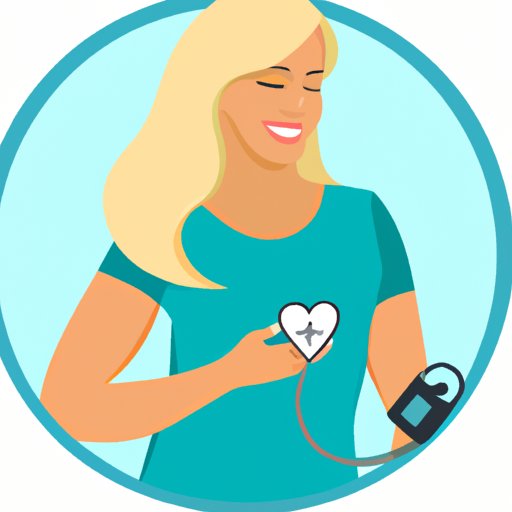Introduction
Preventive care is an integral part of maintaining good health and wellness. According to a report by the Centers for Disease Control and Prevention (CDC), preventive care can help people stay healthy and prevent or delay the onset of chronic diseases. In this article, we will explore what preventive care is, its significance, and why early detection should be a priority for everyone.
Why Prevention is Key: A Comprehensive Guide to Preventive Care
Preventive care refers to measures taken to prevent or detect a health problem before it occurs or gets worse. Preventive care can involve lifestyle changes, regular check-ups, and diagnostic screenings. Some examples of preventive care include vaccinations, cancer screenings, blood pressure checks, healthy eating, and exercise.
Preventive care is different from reactive care, which involves treating conditions after they have already developed. Early detection through preventive care is crucial because it allows for timely treatment that can prevent and mitigate the negative effects of health problems.
The benefits of preventive care cannot be overstated. Preventive care can lead to better health outcomes, fewer complications and hospitalizations, and a higher quality of life. Additionally, it can save significant amounts of money in healthcare costs over time.
Don’t Wait Until it’s Too Late: Understanding the Importance of Preventive Care
One of the most compelling reasons for seeking preventive care is that early detection can help detect health problems before they become serious. For example, early detection of cancer can lead to a higher chance of treating the condition successfully. Without preventive care, health problems may go unnoticed and progress to the point where they become more difficult to treat.
Neglecting preventive care can be a risky proposition. It can lead to missed opportunities for early detection and increased healthcare costs due to later diagnosis. It can also lead to significant emotional and physical stress for patients and their families.
Late diagnosis can be costly, both financially and emotionally. Late-stage cancers, for example, can require more invasive treatments, which can be more expensive and time-consuming. Furthermore, patients and family members may experience significant emotional stress from late diagnosis, including fear, anxiety, and worry.
Preventive Care: Saving Time, Money, and Lives
Preventive care can lead to significant savings in both time and money. Regular check-ups, for example, can help identify health problems before they become serious and require more extensive treatment.
Preventive care measures such as healthy eating, regular exercise, and stress management can not only prevent chronic conditions but can also help to lengthen lifespan. Additionally, preventive care can reduce healthcare costs by avoiding expensive treatments and hospitalizations.
The statistics speak for themselves. According to the CDC, one in three deaths in the United States is caused by a chronic disease that could have been prevented through more effective preventive care measures.
The Power of Prevention: An Inside Look at Preventive Healthcare
Preventive healthcare involves taking proactive measures to maintain good health and prevent chronic conditions. Some examples of preventive healthcare include regular check-ups, cancer screenings, and vaccinations.
The benefits of preventive healthcare are numerous. It can lead to better overall health outcomes, fewer complications and hospitalizations, and fewer healthcare costs. Successful examples of preventive healthcare include initiatives that promote healthy behaviors, such as public education campaigns that encourage exercise and healthy eating.
Preventive healthcare in action can be seen in initiatives such as the National Breast and Cervical Cancer Early Detection Program, which provides free or low-cost cancer screenings to women who meet certain income and age requirements.
Preventive Medicine: A Proactive Approach to Healthcare
Preventive medicine is an essential component of healthcare that involves taking proactive measures to prevent health problems rather than simply treating them after they occur. Preventive medicine can involve lifestyle changes, regular screenings, and vaccinations.
Individuals can take a proactive approach to preventive medicine by making healthy lifestyle choices such as eating nutritious foods, exercising regularly, getting enough sleep, and reducing stress. Personal responsibility is a key component of preventive medicine.
In the future, innovations in technology and medicine may lead to more personalized preventive care measures. For example, advances in genetic testing may allow individuals to receive personalized recommendations for lifestyle changes and health screenings based on their unique genetic makeup.
From Screening to Prevention: The Benefits of a Preventive Care Lifestyle
Living a preventive care lifestyle involves incorporating healthy habits into daily life and taking a proactive approach to maintaining good health. This can include a variety of preventive care measures, such as regular check-ups, cancer screenings, vaccinations, healthy eating, and exercise.
The benefits of a preventive care lifestyle are numerous. Living a preventive care lifestyle can lead to better overall health, fewer chronic conditions, and increased longevity. Additionally, it can lead to a more positive lifestyle, including increased physical activity, healthier eating habits, and improved mental health.
Examples of living a preventive care lifestyle include regular exercise such as walking or running, incorporating healthy foods into meals, and engaging in stress-reducing activities such as meditation or yoga.
Conclusion
Preventive care is an essential component of maintaining good health and wellness. Early detection is key to effective treatment and can prevent chronic conditions from developing or becoming more severe. By incorporating healthy lifestyle habits and taking advantage of preventive care measures such as regular check-ups and screenings, individuals can reduce their health risks and improve their overall well-being.
It’s important to remember that preventive care is not just for those who are already sick or at high risk for chronic conditions. Everyone can benefit from a proactive approach to healthcare that emphasizes keeping the body healthy and preventing health problems from occurring.
Take advantage of the opportunities available for preventive care and start making healthy changes to improve your overall well-being today.
